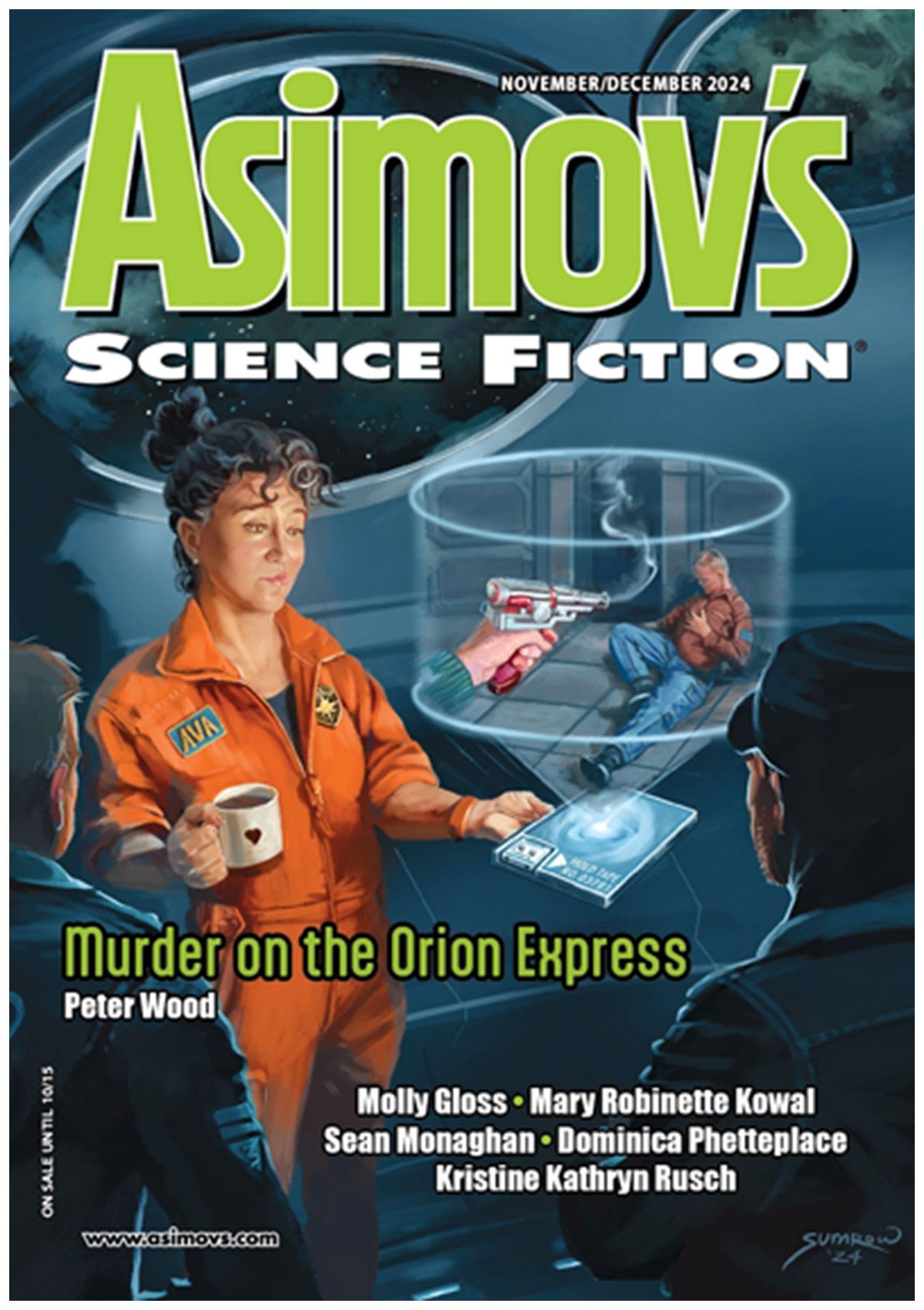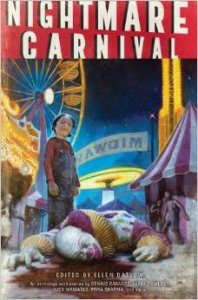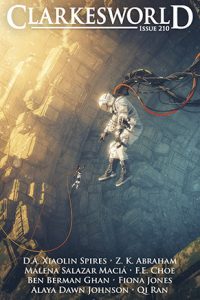Asimov’s: Short Fiction Reviews by A.C. Wise
The November/December issue of Asimov’s opens with “Death Benefits”, a novella by Kristine Kathryn Rusch. A series of vignettes highlight various casualties of war, interspersed with the story of Davidson Turo, a private investigator who is approached by a client who has seen footage of her lover’s death, but is convinced it’s fake and that he’s still alive. Rusch does a lovely job of exploring grief and loss, looking at the human cost of war, and sharing intimate portraits and moments of hope and joy to counterbalance the pain the characters experience. “Wápato” by Molly Gloss is a gentle ghost story wherein Sheila experiences time slips that manifest as a kind of benign haunting, putting her back into moments from her past. After an accident, she grudgingly accepts help from a local shop owner, and ultimately learns new ways to relate to the living, as well as the dead, and how to live a more balanced life.
In “So Long in Miami” by Garrett Ashley, the narrator travels to a semiflooded future Miami, cut off from the mainland, to take a job. Once there, they discover the woman they’ve been corresponding with, Sadia, is colony-born, not Earth-born, and they must decide whether to trust her even though she lied about her identity. “Dreamliker” by Dominica Phetteplace explores a potential use of AI as Zora is recruited by a company that purports to help people process their grief by having operators work with AI so clients can have conversations with facsimiles of their lost loved ones. “Mere Flesh” by James Maxey also explores a potential use for AI. Robert’s father suffers from Alzheimer’s, but an experimental implant helps with his memory. However, when his behavior grows increasingly erratic, Robert suspects the AI may have taken over.
In “The Start of Something Beautiful” by Zack Be, Seven is a content creator on a space station struggling with making art that feels meaningful. When a micrometeor strikes and the one real astronaut on board is temporarily knocked out, she stages a dangerous rescue, which gives her new purpose and direction. “Murder on the Orion Express” by Peter Wood is a whodunit set on a ship making a 125-year journey to Orion. Ava, a detective, is woken from cryosleep to investigate the apparent murder of Rockford, the leader of one of the factions on board. The prime suspect is the captain, who maintains his innocence, despite footage suggesting his guilt, further complicated by the fact that the body is missing. Wood offers up a satisfying mystery populated with well-drawn characters whose personalities and interpersonal relationships add layers to the crime they are attempting to solve. “The Ledgers” by Jack Skillingstead is surreal story that evokes both the feel of classic sci-fi and Russian literature, centered on Hank Stroud, a civil servant living in a world with a vague, undefined war happening in the background. Hank witnesses a possible murder, comes across what appears to be the victim of a second murder, and begins losing his grip on reality and his sense of self.
In “Deep Space Has the Beat” by Mary Robinette Kowal, business partners Isolde and Janarius try to impress a potential investor and get her to buy into their kinetic dance floor concept. However, someone at their club keeps hacking their screens to show porn, leading them to suspect sabotage as they scramble to keep the problem hidden while trying to catch the culprit. Another novella, “Wildest Skies” by Sean Monaghan, closes out the issue. Ed crash-lands on a planet that he knows to be habitable, but which appears deserted, after a mysterious missile fired from the surface obliterates his ship. The planet’s occupants turn out to be hunter-gatherers who help him to recover then direct him to another part of the planet where he learns he’s not the first or only human crash survivor living there.
Recommended Stories:
“Death Benefits”, Kristine Kathryn Rusch (Asimov’s 11-12/24)
This review and more like it in the January 2025 issue of Locus.
 While you are here, please take a moment to support Locus with a one-time or recurring donation. We rely on reader donations to keep the magazine and site going, and would like to keep the site paywall free, but WE NEED YOUR FINANCIAL SUPPORT to continue quality coverage of the science fiction and fantasy field.
While you are here, please take a moment to support Locus with a one-time or recurring donation. We rely on reader donations to keep the magazine and site going, and would like to keep the site paywall free, but WE NEED YOUR FINANCIAL SUPPORT to continue quality coverage of the science fiction and fantasy field.
©Locus Magazine. Copyrighted material may not be republished without permission of LSFF.








